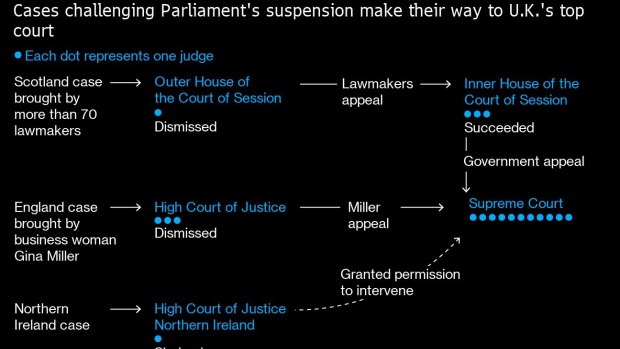Sep 19, 2019
Judges Narrow Down Options for Boris Johnson in Supreme Court Case
, Bloomberg News

(Bloomberg) -- Supreme Court judges continued to narrow the British government’s wiggle room on the second day of hearings in a landmark legal challenge to Prime Minister Boris Johnson’s suspension of Parliament.
On Wednesday, some of the 11 justices asked government lawyer James Eadie why the administration hadn’t submitted a signed witness statement as part of its case. Judge Brian Kerr also requested a written undertaking stating what the government would do should it lose the case.
After Eadie committed to delivering the letter, Supreme Court President Brenda Hale said “it will be entirely inappropriate if you don’t do it by the end of tomorrow.”
The three-day hearing ends Thursday, with the justices retiring to consider their verdict. The case not only threatens to undermine Johnson’s position as prime minister, but could also curtail the British executive’s longstanding power over when the legislature sits. Johnson could be forced to recall Parliament, giving opponents of a no-deal Brexit more room to try to thwart his “do or die” promise to leave the European Union with or without a divorce agreement on Oct. 31.
The Supreme Court’s judgment will be the final word on whether Johnson’s decision to suspend Parliament for five weeks just ahead of a deadline to find a Brexit deal is lawful. It’s the result of challenges brought by businesswoman Gina Miller and nearly 80 lawmakers in lower courts in London and Edinburgh respectively.
A London court had ruled in Miller’s case that Johnson’s actions were political, and so not an area for court oversight. Meanwhile, a Scottish court had said that Johnson was trying to stymie Parliament and the suspension is unlawful. The Supreme Court is hearing an appeal to both cases.
The Supreme Court’s request for a commitment from the government comes because the judges are likely to only rule on the legality of Johnson’s action and won’t dictate what happens next.
“Whatever the government says to the court in a letter will have quite a high status in terms of tying the government’s hands,” said Murray Hunt, the director of the Bingham Centre for the Rule of Law and a legal adviser to Parliament. “It can’t mislead the court. The reason the court is concerned about that in this case is because the government appears to have been sowing some doubt about what it’s going to do if it loses the case.”
Eadie began Wednesday by arguing that suspending Parliament is a normal government action and that there is no legal basis for determining for how long this can be. He also said there was still plenty of time for lawmakers to challenge Johnson on his plan to leave to the European Union without a deal.
Legal Basis
“There is time and it’s up to Parliament and the government to legislate what they consider necessary,” Eadie said. He challenged the authority of the court to rule, arguing that there was no legal basis.
Aidan O’Neill, representing almost 80 Scottish lawmakers who won their case against the government in Edinburgh, used florid language to question whether the judges could trust Johnson to abide by any ruling.
O’Neill invoked Shakespeare and U.K. history to highlight the importance of preserving the unity of England, Wales, Scotland and Northern Ireland, something he said could be accomplished by a strong Supreme Court. He then said the government’s reason for suspending Parliament was to limit scrutiny while it changed the historic relationship with the EU.
“Listen to the angels of your better nature and rule this prorogation is unlawful, an abuse of power,” O’Neill said in his closing speech. “This government is showing itself unworthy of our trust. Enough is enough. That is what truth speaking to power sounds like.”
Jolyon Maugham, a lawyer who is supporting the Scottish case, lauded O’Neill’s oration.
“What Aidan sought to do today is drag the case out of the technocratic reeds and show the court what’s really at stake here,” Maugham said in an interview broadcast by the BBC. “I’m really glad he did that.”
On Thursday, the attorneys will make their final arguments along with former Prime Minister John Major, who has joined Miller’s case against prorogation.
To contact the reporters on this story: Franz Wild in London at fwild@bloomberg.net;Jeremy Hodges in London at jhodges17@bloomberg.net;Jonathan Browning in London at jbrowning9@bloomberg.net
To contact the editors responsible for this story: Anthony Aarons at aaarons@bloomberg.net, Christopher Elser, Thomas Penny
©2019 Bloomberg L.P.







